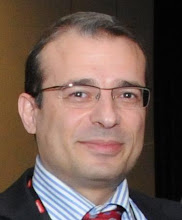Oil Prices and Speculators
I believe that, in today’s oil market, speculators do play an important role in determining the direction (if not setting) of the oil prices. Note that there is no supply constraint in paper trading.
First look at how many traders are active in NYMEX Futures (see CFTC site) and look how many long and short contracts there are and by type (commercial and non-commercial. Non-commercial ones are known as speculators). Who are these non-commercials?
While the CFTC reports show futures and options positions on the NYMEX, they do not reflect the OTC energy markets at all. This is still where a very big chunk for oil and gas trading takes place. Futures dominate short-term trading, while the OTC markets dominate the long-term energy markets. And who are the buyers/sellers at OTC? I don’t know.
1. The volume of crude oil traded in futures markets far exceeds the actual available volume. Only a very tiny amount is actually delivered. For example, over the 7 years that the December 2001 NYMEX crude contract was traded (5 billion barrels), only 31,000 barrels were actually delivered on these contracts. Approximately 150,000 contracts for WTI are traded daily on the NYMEX, representing a volume of crude almost twice the world’s daily production.
2. Unlike the NYMEX contract, the IPE contract does not provide physical delivery. Instead it tracks the Brent forward contract and employs cash settlements. IPE Brent Crude futures total volume for 2003 was 24,012,969 lots, up by 12% over the previous year. This amounts to about 66 Mb/d [see Pipeline Magazine of IPE]. Approximately 75000 contracts for Brent crude futures, representing 75 Mb, are traded daily on the IPE.
3. No OTC effect here. On top of this, following the introduction of electronic trading of the IPE Brent crude futures contract and securing the relevant regulatory approvals in Japan and Singapore, Intercontinental Exchange (ICE) has been able to connect its OTC contracts seamlessly to the IPE futures market. Consequently in May 2004, ICE launched two crude oil arbitrage contracts between Brent and both Dubai (Dubai EFS) and WTI. So, more place to speculate.
In sum, only in NYMEX and IPE futures, each trading day more than 3 times of daily world oil production is sold. And this is only the registered ones, and think of ACCESS and OTC trading.
Who are those speculators?
Hedge funds (used to rich peoples money but now money from private banks, pension funds and insurance companies go there too) (see WSJ, 21 Sept 2004 for some fund names, for example). Add to this pension funds.
Plus, Goldman Sacs now claims to be the world’s biggest oil trader. Most other global investment banks also have a commodities division that deals in oil. The oil majors who strive to hedge profitability against adverse movements in prices, are also major players. (The Times , June 3, 2004).
Add to this Barclays, Morgan Stanley and Goldman Sachs and ABN Amro.
And also Citigroup Inc, UBS AG, Switzerland.
The Board of Governors of the federal reserve System has adopted an amendment to regulation Y (bank Holding Companies and Change in Bank Control) that would permit BHC a) to take and make delivery of title to commodities underlying commodity derivative contracts on an instantaneous, pass-through basis b) to enter into certain commodity derivative contracts that do not require cash settlement or specifically provide for assignment, termination, or offset prior to delivery. Rules became effective August 4, 2003.
And add to these maybe oil companies, why not?
I think, futures markets should indeed be reconsidered. Maybe then we will know better what the real supply and demand is.
Oh yes, speculators don't set the contract price but they intensify a price movement beyond or below what the fundamentals warrant.


0 Comments:
Post a Comment
<< Home